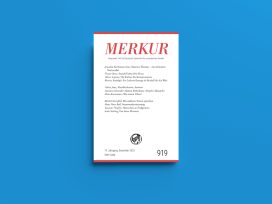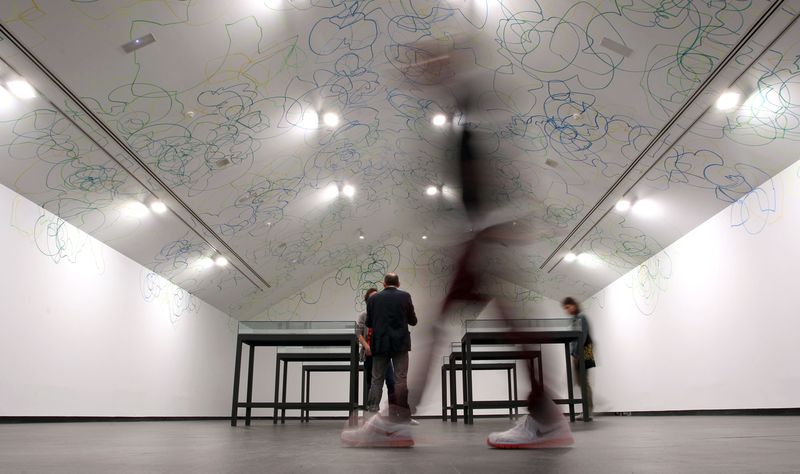
Cosmic Europe
Merkur 12/2025
Leibniz’s Europe; why majority rule is relative; social chromatics off the scale; travels in post-capitalism.
Many things to many people, postmodernism is notable for the endings it has brought about in many fields. But is it now curtains for postmodernism itself?
Postmodernism is widely considered to be the movement that has brought about several endings: the ending of metanarratives as collective idealisms, the ending of history as the end of totalitarian systems, the ending of reality as a simulated end, the ending of seriousness as the end of nostalgia, the ending of inspiration as the end of literature’s sacredness, the ending of magic as the end of the author’s magic trick, the ending of creation as the end of originality and the ending of the novel as the end of genre purity. Yet, in the 1990s, another ending was being talked about – that of postmodernism.
Industry is increasing the scale of pollution on a daily basis, the economy is powerless to fill the world’s hungry stomachs, the overwhelming development of vehicle production helps increase accident rates, nuclear weapons threaten a thermonuclear war – which is why modernism’s positivist epistemology, based on the idea that knowledge and science will make the world a better place, does not sound very convincing. Postmodernists were the first to express doubts about this epistemology, viewing it simply as another metanarrative (fr. métarécit) and insisting on the idea that, just like others, it was subject to abuse.1 Postmodernism is thus not a tendency of modernism, but quite the opposite.
Jean-François Lyotard’s notion of métarécit has become widely recognized as a metanarrative, encompassing the idea of grand narratives such as enlightenment, idealism, communism and others that postmodernism rejects by declaring its distrust in them. Simplifying to the extreme, I define postmodern as incredulity toward metanarratives.2In short, postmodernism brings about the end of metanarratives.
In 1989, with the fall of the Berlin Wall and communism, Francis Fukuyama published his famous essay The End of History, which he later expanded and supplemented. This philosophical phrase that marked the end of history was preceded by some religious and philosophical metanarratives. It is unanimously accepted that the precursors of Fukuyama were Hegel, Marx and Kojève, according to whom “the end of history” meant the coming of freedom for all, as a result of the Napoleonic wars, after which there would be no more wars and revolutions (Hegel); the advent of class equality which was seen as the end of the class struggle, the greatest conflict in history (Marx); and the advent of a post-revolutionary state as an ideal (universal and homogeneous) one, which would bring an end to class and national conflicts (Kojève). So the end of conflicts is the beginning of a peaceful life and the end of human history, which becomes the subject matter of Fukuyama, according to whom the end of history means the coming of liberal democracy as the only form of governance for all countries.3
Of course, Fukuyama’s thesis was questioned and criticized by various philosophers, as it purports to convince people that ‘American-style’ democracy is the sole genuine political system, although his thesis is illustrated with examples from the European Union and proclaims democratic pluralism.
In spite of its religious background, the term simulacrum is related to postmodern reality. According to Jean Baudrillard who launches and represents the philosophy of simulation, today’s reality is no longer a reality, as it is dominated by virtuality. He bases his concept of simulation on the virtual world offered by the screen in the simulated world of Disneyland, in a world overwhelmed by media transforming it into hyper-reality. It was thus to be expected that he would declare, after the collapse of the Twin Towers on September 11, 2001, that “they did it, but we wanted it”, suggesting that we had been longing for something big and true to happen for real, as such things by then only occurred in a simulated way.
According to Baudrillard, hyperreality as a postmodern state has replaced reality. The internet and the media have created a media reality that has brought the end of banal reality. Consequently, as reality has become hyper-reality, literature has turned from fiction to surfiction (Spanos) or metafiction (Hutcheon).
Even when dealing with serious topics, postmodernism processes them in complex structures, and filters them through ironic discourse. The irony is not articulated simply as mockery, but rather as a rational proof vest that protects the writer from nostalgia. In order to combat nostalgia, postmodernism turns everything into an ironical game, which is why the era of postmodernism is also termed the era of irony.
According to Linda Hutcheon, being a historiographic metafiction, the postmodern narrative is pastime with past time. 4 This leisure, as can be assumed, is limited to the content, while the game continues with the form (montage, collage, bricolage, etc.). Thus, irony is a postmodern filter of serious stories.
In antiquity, inspiration was viewed as a sacred act that preceded creation or writing. It was assumed that the poet was in a divine drunken state during inspiration and belonged to God (gr. enthousiasmos; belonging to God). This concept was maintained until romanticism, only to be questioned in modernism, and denied in postmodernism. The passage of literature from degree zero to second degree is the passage from inspiration to combination. Thus, the entire postmodern literature is ars combinatoria, with a style of bricolage.
In postmodern literature, inspiration is denied because the postmodern author takes the subject from various books and documents to structure the new text as a network of countless references and quotations. The author’s learnedness rejects inspiration by muses. The postmodern work is controlled by reason, not emotions.
For a long time, readers have read novels that were offered to them as a result, not as a process. Since ancient times theoreticians have spoken of the principles of literary writing, but without the process of creation. Creation was regarded as a kind of magic by the writer, who offers us only the result of that magical process.
However, the explanation of this process in postmodernism turns into a creative principle known as poioumenon.5 The term refers to a specific type of metafiction which indicates the process of creation, such as when, during narration, the narrator refers to the work being created and starts explaining how (s)he started it, and how (s)he will continue and then end it. This phenomenon occurs often, such as with Vladimir Nabokov’s Pale Fire, Salman Rushdie’s Midnight’s Children, Kurt Vonnegut’s Slaughterhouse-Five or Breakfast of Champions, etc.
The poioumenon phenomenon has become an identifying mark of postmodern novels, with the reader somehow becoming a participant in the postmodern text’s construction, or at least being allowed to participate in the workshop of the writer and see his magic trick.
Although all writers of a language deal with an equal number of letters, some are considered great and some inferior. Although all writers of a language use the same characters, they still try to be different. All writers of a language have one alphabet, meaning they have the same number of letters available. Logically, the greatest creator of a national literature is the inventor of the alphabet. Others are not creators (inventors), but combinators. Paradoxically, the latter are considered creators, rather than the former, which means that combinators, and not inventors, are creators.
In this sense, Umberto Eco saw the alphabet as the first combinatorial machine. Different people combine the same letters. Different people combine the same letters differently. In Orwell’s terms, we could say that all writers are equal, but some writers are more equal than others. They are “equal” (the same) in the tools (letters) they possess, but are “more equal” (different) in their ability to use those tools. And the value of writers is not in creating, but in “combining differently.”
The alphabet is the invention. Everything else in literature is a combination of letters, yet in postmodernism a novel cannot simply be called a combination of letters, but a combination of signs. Images also enter the novel through the method of montage, with techniques of collage, cut-up, or découpé (started by Dadaists and followed by postmodernists), which allows for the implication of photos, pentagrams, paintings, drawings and sketches in the text.

Sin título, 2013; Carlos Maciá. Photographer: Jaime Villanueva. Source: Flickr
The potpourri (Walker 1996) in postmodern theory marks the work that mixes everything inside itself, the work built by the montage technique and resulting in a collage. Art knows no geographical boundaries, so the inclusion of different cultures within a work of art is quite normal, particularly today, when art is seen more as a combination than a creation. The postmodern author does not conceive originality as ex nihilo invention, but as a specific way of treating an object.
As John Barth says, postmodern literature is a literature of exhaustion, which is why it operates with previous practices, thus earning the epithet of the literature of replenishment, and receiving within it all previous literary practices, because it is an ars combinatoria. Because the postmodern work is a bricolage, postmodern authors are often accused of plagiarism. Among the most famous examples is D. M. Thomas’s novel The White Hotel, which imitates many styles, mixes many materials previously dealt with by others and contains several paragraphs of Anatoly Kuznetsov’s Babi Yar.
Thus, creation comes to an end as originality and lives under the mask of authenticity.
According to two scholars, Wellek and Warren, ‘theory of genres is a principle of order: it classifies literature and literary history not by time or place (period or national language) but specifically literary types of organization or structure.’6
This theory of the three literary genres was launched at the time of romanticism. Lyrical, epic and dramatic genres are the arch-genres of the romantic triade.7 Goethe, being a romantic rebel, disobeyed the rules of literary genres, on the ground that their combination can produce unlimited variations of poetic genres. Aristotle was not a follower of genre purity either, while Plato included the epopee under the mixed manner. Linda Hutcheon, having studied the poetics of postmodernism, reaches the conclusion that there can be no more talk of a pure genre of postmodern work, because there is intertextuality and complex generic interaction. 8
Therefore, the terms novella and novel are devoid of the genre-determining meaning, marking only what Genette calls manner (fr. mode), which in these cases is a narrative manner, although within those literary works one encounters a variety of forms, discourses and styles that, in case of sticking to strict principles, should be left out.
In postmodernism, the novel is considered the dominant literary form. Yet, with poetry, drama, scientific, religious, political and other texts introduced within this form, the very nature of the novel is questioned. The novel has indeed dominated, but once the question is asked about what percentage of it has been a novel and what percentage other forms, a suspicion arises about its dominance, and a need emerges to view it more as bricolage of genres than as a self-sustained form. Thus, the novel has ended thanks to the very punches it has received from other genres internally.
Postmodernism marked the beginning of a new sensitivity and the end of an old form, because it was written with ironic filters and erudite capacity. Yet, by the 1990s, there was an attempt to substitute it by other movements which consider it an ended period.
Postmodernism has ended as a period, and as an already finished project is has enriched the golden fund of literary canons (like classicism, neoclassicism, romanticism, realism or modernism), permitting new movements and poetics to follow. Linda Hutcheon, Ihab Hassan, Andreas Huyssen, Raoul Eshelman, Alan Kirby, Tom Turner, Mikhail Epstein, Eric Gans, Robin van den Akker, Billy Childish, Charles Thomson and others have spoken about the end of postmodernism. Some have even suggested designations for the era following postmodernism: performatism (Eshelman), digimodernism (Kirby), post-postmodernism (Turner), trans-postmodernism (Epstein), postmillennialism (Gans), metamodernism (van den Akker) remodernism (Childish and Thomson), etc.
While the majority insists on protecting and promoting their own designations, Eshelman insists on the end of postmodernism, leaving the naming of the new era to time itself: ‘Naming epochs (or anything else in the humanities) is a big gamble. There are a lot of names floating around now—performatism, metamodernism, digimodernism, post-postmodernism, to name just a few. Probably it will take years before any real consensus emerges. “Postmodernism” wasn’t generally accepted as a term until the late 1980’s, after it had already been going on for more than thirty years. We’re in about the 20th year of what I call performatism, so I’m not holding my breath. May the best term win!’9Andreas Huyssen concludes that the priority of our time is not to invent a term to name this chaotic era: ‘The current situation is too “unübersichtlich” (a term Habermas already used to describe postmodernism 30 and more years ago) to encapsulate it in a single term. Just look at the multiplication of biennales across the world. There are “other stories” of modern experience, polyvocal interventions, a cacophony of styles, practices, media experiments for which it would be presumptuous to come up with one name. There is no such thing as “global literature”, or Weltliteratur, least of all literature written in English. The most common name by default, as it were, has become “contemporary art.” But maybe we should forget the issue of naming and instead focus on the differently situated narratives of art and literature, on certain nodal points in a world wide web of lived experience and its translations into art and literature.’10 Linda Hutcheon, who created the poetics of postmodernism, confirms the end of postmodernism but prefers not to participate in the debate of naming the next era: ‘I do think we are on the verge of something new, or perhaps we are already there, and it is going to have everything to do with the digital technologies and new social media that are now part of our lives. I don’t worry that we don’t have a label for it yet: we will. But this feels like something new to me.’11 Meanwhile Ihab Hassan asks what is there beyond postmodernism, and then answers: ‘we hardly know what postmodernism was.’12
For the time being we cannot know what term will name our era, but one thing is certain: postmodernism that brought so many endings, has ended.
Walker, Thomas. “Postmodernism and the study of the future.” Futures Research Quarterly, 1996.
Lyotard, Jean-François. La condition postmodern. Paris: Minuit, 1979, p. 7.
See: Fukuyama, Francis. “The End of History?” The National Interest, summer 1989.
Hutcheon, Linda. A Poetics of Postmodernism. New York and London: Routledge, 1988, pp. 105-123.
Fowler, Alastair. The History of English Literature. Cambridge: Harvard University Press, 1989, p. 372.
Wellek, René; Warren, Austin. Theory of Literature. New York: Harcourt Brace & Company, 1984, p. 226.
Genette, Gérard. Introduction à l’architexte. Paris: Seuil, 1979, p. 70.
Hutcheon, Linda. A Poetics of Postmodernism. New York and London: Routledge, 1988, p. 139.
Eshelman, Raoul. “Performatism, the epoch after postmodernism.” Symbol, No. 2, Tirana – Prishtina – Skopje, 2014, p. 7.
Huyssen, Andreas. “The past, present and future of art.” Symbol, No. 4, Tirana – Prishtina – Skopje, 2015, p. 15.
Hutcheon, Linda. “Beyond Postmodernity.” Symbol, No. 1, Tirana – Prishtina – Skopje, 2013.
Hassan, Ihab. “Beyond Postmodernism: Toward an Aesthetic of Trust.” Modern Greek Studies, Vol. 11, Australia – New Zeland, 2003, p. 303.
Published 26 June 2017
Original in English
First published by Symbol No. 10 (2017)
Contributed by Symbol © Symbol / Ag Apolloni / Eurozine
PDF/PRINTSubscribe to know what’s worth thinking about.

Leibniz’s Europe; why majority rule is relative; social chromatics off the scale; travels in post-capitalism.

Throughout history, Belarusians have turned to their rich folklore traditions in harsh times. What may appear as a period of cultural stagnation is often a moment of resilience and creative revival. And the current wave of Belarusian folk texts, music and dance is no exception.